UN membership: what was all the fuss about?
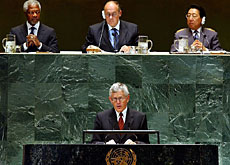
It took well over half a century and plenty of pushing and shoving but on September 10, 2002, Switzerland finally joined the United Nations.
Yet while public support for membership has strengthened over the past five years, more and more people are turning against the idea of sending Swiss troops on UN peace missions.
In March 2002 a nationwide vote saw 55 per cent of the electorate come out in support of Switzerland joining the world body, and approval rates have remained positive ever since.
According to the Security 2007 survey, published last month by Zurich’s Federal Institute of Technology, 61 per cent of respondents “strongly agree” or “rather agree” that Switzerland should “actively engage in UN matters”.
Andreas Ladner, a politics expert at Lausanne’s Graduate Institute of Public Administration, says one of the reasons the public has warmed to UN membership is because the Swiss have been fairly active within the world body.
He cites the field of human rights as one example – the new UN Human Rights Council in Geneva, which last year replaced the widely discredited Human Rights Commission, stemmed from a Swiss initiative.
“People have got accustomed to the idea that we are now part of it and they realise that it’s not that bad at all,” Ladner told swissinfo.
Tough opposition
In many ways it’s hard to believe that the UN’s 190th member only joined five years ago – and even then in the face of tough opposition from the rightwing Swiss People’s Party and the isolationist Campaign for an Independent and Neutral Switzerland.
Reluctance to join was all the more surprising since Geneva has been home to the European headquarters of the UN since 1966.
For Hans Hirter, a political scientist at Bern University, the stable levels of support over the past few years reflect the fact that UN membership is no longer seen as a contentious issue.
“I don’t think people’s opinions have changed that much since 2002. Nowadays it’s more a question of indifference,” he said.

More
Campaign for an Independent and Neutral Switzerland
Deploying troops
Yet the same cannot be said for the idea of deploying Swiss soldiers on UN peacekeeping missions. Support has declined steadily since 1999, dropping from 69 per cent to 54 per cent last year.
“This is because it’s more in the news and is still an issue – or at least the People’s Party tries to make an issue of it,” said Hirter.
Ladner adds that the idea of “active neutrality”, which was bandied around in some quarters a few years ago, is no longer strong currency in Switzerland.
“It’s a rather delicate matter for many people to what extent Swiss soldiers should take part in conflicts, especially when armed. The idea of getting involved in conflicts in this way is not broadly accepted,” he said.
“That might change over time but we don’t have a clear debate on this at the moment.”
International law
Indeed the loss of the country’s traditional neutrality was one of the big sticks used by opponents five years ago to try to beat the electorate into submission.
Justice Minister Christoph Blocher, then not a member of the Swiss cabinet, also argued that membership would undermine direct democracy, because diplomats and officials at the UN would set international law above Swiss law.
He resurrected the theme last month in an address on Swiss National Day – August 1 – provoking much hullabaloo in the Swiss media.
But while such fears struck a chord with the electorate in the previous vote on UN membership – in March 1986 when 75 per cent of Swiss voters rejected the idea – they were not so in tune five years ago.
By then, according to Hirter, the UN had ceased to be seen as the country’s bête noire – a mantle that had shifted on to the European Union.
“The Cold War had ended and with the advent of globalisation, people could see it was bad for Switzerland’s image being one of the last countries not being in there [the UN],” said Hirter.
swissinfo, Adam Beaumont

More
Neutrality
The debate over joining the UN began to gain some momentum in Switzerland towards the end of the 1960s. The government presented its first UN report in 1969, which concluded that it was too early to join.
It was not until 1977 that the government adopted membership as a goal. But the public and the cantons were not ready to follow suit: in March 1986 they overwhelmingly rejected the idea at the ballot box.
It was not until the mid-1990s that politicians tried again. In 1998 the government presented its fourth UN report, declaring membership as a “strategic goal”. Switzerland became the 190th member of the UN four years later.
At a news conference in Bern on Monday Foreign Minister Micheline Calmy-Rey said joining the UN five years ago had boosted Switzerland’s credibility and standing in the eyes of the world.
She noted that the Swiss were the 14th biggest contributors to the world body, stumping up SFr126 million ($106 million) this year.
Calmy-Rey said Switzerland would look to strengthen its position at the heart of the UN in the coming years, with a seat of the Security Council a possible goal by 2020.
The government is still to decide on whether it wants to put forward a candidacy.
Calmy-Rey also advocated a stronger commitment to UN peacekeeping missions but declined to comment on whether Switzerland would participate in the UN’s Darfur mission.
She added that the Swiss would continue to act as an independent facilitator on the global stage and serve as a bridge between the North and the South.

In compliance with the JTI standards
More: SWI swissinfo.ch certified by the Journalism Trust Initiative
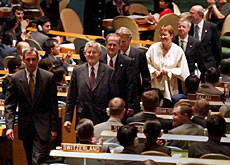
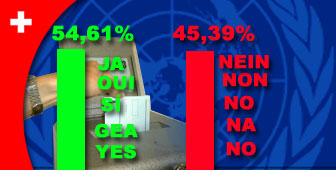
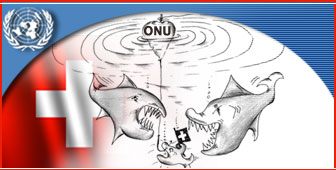
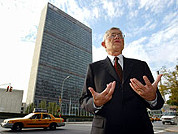
You can find an overview of ongoing debates with our journalists here. Please join us!
If you want to start a conversation about a topic raised in this article or want to report factual errors, email us at english@swissinfo.ch.